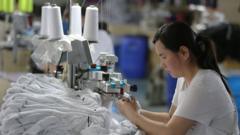A notable turnaround in US-China trade relations was evident as President Trump praised the ongoing discussions, revealing a desire for constructive change. As both nations grapple with tariffs affecting their economies, the focus shifts to potential concessions and the future of trade ties.
Trump Highlights Positive Shift in US-China Trade Relations After Geneva Talks

Trump Highlights Positive Shift in US-China Trade Relations After Geneva Talks
Following two days of trade negotiations in Switzerland, President Trump expresses optimism about the dialogue between US and Chinese officials, citing a friendly atmosphere.
In a significant update on international trade relations, President Donald Trump has characterized the recent talks between US and Chinese officials as a "total reset." These discussions kicked off in Geneva, Switzerland, marking a pivotal moment for both nations. In a post on social media, Trump conveyed that the initial day of deliberations was "very good," noting that the negotiations transpired in a "friendly, but constructive, manner."
The backdrop for these talks is an escalating trade war that has seen the US impose tariffs of 145% on Chinese imports. In response, China retaliated with its own levies amounting to 125% on US goods. After a prolonged period of escalating tensions, this weekend's meeting represents the first face-to-face engagement since Trump enacted those tariffs at the beginning of the year.
Details from the discussions remain scant apart from Trump's enthusiastic remarks. The talks are being carried out between China’s Vice-Premier He Lifeng and US Treasury Secretary Scott Bessent, continuing into Sunday. Trump stressed the importance of opening China to American businesses, asserting that "GREAT PROGRESS MADE!!!"
Ahead of these meetings, White House Press Secretary Karoline Leavitt emphasized that the U.S. would not be lowering tariffs without reciprocal moves from China, indicating that both parties would need to make concessions. The contrasting positions highlight the complexities as Beijing insists on reductions in tariffs while the U.S. aims for de-escalation without committing to a comprehensive trade agreement.
Chinese state media reported that the country's decision to engage with the U.S. stems from considerations of global expectations, national interests, and feedback from American businesses. Alerts about how U.S. tariffs are affecting Chinese exporters echo the ongoing concerns, with reports detailing companies like Sorbo Technology facing inventory challenges due to goods being stuck amid rising tariffs.
The trade conflict intensified last month as Trump introduced a universal baseline tariff on imports, branding it "Liberation Day." This measure affected around 60 trading partners deemed "worst offenders," including China and the EU. Moreover, the U.S. has seen economic contraction as firms endeavored to introduce goods into the country amidst rising costs.
As part of trade discussions, a new agreement has emerged between the U.S. and the U.K. that will see a reduction in certain tariffs on UK cars, showcasing how international negotiations continue to evolve in this contentious environment. The UK will experience a reduction from a 25% to a 10% import tax for up to 100,000 vehicles, reflecting ongoing strategic discussions that impact global trade dynamics.





















